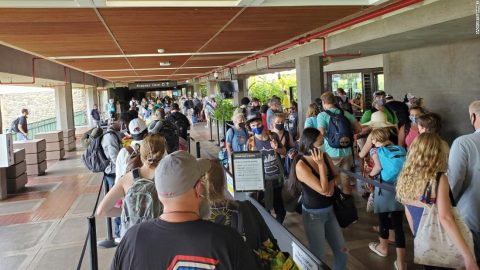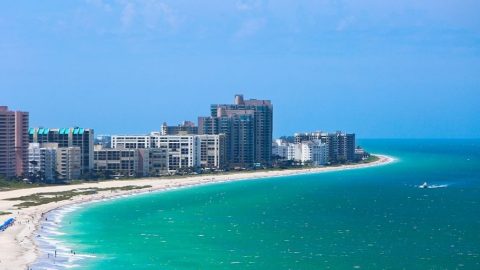(CNN) — Backpacking trips have been something of a rite of passage for young people for almost 70 years.
Whether you’re setting off around the world, or exploring a particular region, country, or city, taking off with a few belongings and moving from destination to destination remains a hugely attractive prospect for those searching for fun and adventure.
Although round-the-world trips vacations date back centuries, it wasn’t until the 1950s and 60s, when backpacking as we know it truly began.
The popularity of the trail led to the publication of the first Lonely Planet guidebook, “Across Asia on the Cheap,” in 1973, written by co-founders Tony and Maureen Wheeler.
While backpacking has certainly evolved in the years since then, it tends to involve hopping from place to place, staying in hostels, picking up temporary jobs here and there and bonding with fellow travelers.
“It’s very easy and accessible. I’ve been backpacking for 20 years now and the sense of connection, humanity and curiosity never ends no matter how old I get.”
One of the many appeals to this type of travel is affordability. Backpackers can bed down in hostel dormitories for a fraction of the price of hotels, and the growth of low-cost carriers helped to open things up for those who had previously seen travel as out of their reach financially.
Such requirements will likely end up being rather costly for those planning to visit multiple destinations where tests aren’t provided free of charge.
The backpacker buck

Around 45 million backpacking trips are taken every year according to WYSE Travel Confederation.
Kai Schwoerer/Getty Images
So can this form of low-cost, independent travel really survive a new age of social distancing, test and trace, potentially rising flight prices and constantly changing travel restrictions?
There’s no doubt that the loss of income from backpackers has impacted the destinations these travelers frequent in large numbers.
Although backpacking is a relatively cheap way to travel independently, it brings in a huge amount of revenue to the tourism industry.
Southeast Asia has remained one of the world’s most popular backpacking spots since the hippie trail days and Thailand is undoubtedly one of its top destinations.
The bustling street lined with bars, restaurants, hostels and street vendors previously had hordes of high-spirited travelers spilling out at every corner.
But Khao San Road lay pretty much deserted for months when Thailand closed its borders in April.
However, business remains relatively slow due to the lack of travelers and the fact the most hotels are still closed.
Undesirable customers?

Bangkok’s Khao San Road, one of the most famous backpacker strips, is suffering due to a lack of travelers.
MLADEN ANTONOV/AFP via Getty Images
But does a city like Bangkok, along with similar destinations that were largely overrun with travelers before the pandemic, actually want backpackers back?
After all, low budget travelers have — perhaps unfairly — become synonymous with bad behavior over the years, and the likes of Australia, another top backpacking spot, have seemingly taken steps to discourage them from visiting.
In 2017, a controversial “backpacker tax” was introduced, meaning people on working holidays could be taxed 15% — Australian workers have a tax-free threshold of A$18,200 (US $12,500).
“Most destinations are focusing on high-yield market segments now,” Denis Tolkach, assistant professor at the School of Hotel and Tourism Management at Hong Kong Polytechnic University, told CNN last year.
“Backpackers are traditionally known for exploring destinations off the beaten track, purchasing local products and interacting with local residents, but in large numbers they can inflict damage to the local environment, culture and community through partying and misbehaving.”
With that in mind, could the after effects of Covid-19 see places that have become weary of budget travelers opting to keep them out for good?
His words were viewed as a direct snub to backpackers, many of whom arrive on working holiday visas and take on jobs such as fruit picking and farm work.
“Pre Covid, international youth arrivals were about 25% of total visitor arrivals for New Zealand and contributed about 1.5 billion New Zealand dollars to the economy,” she tells CNN.
“So it [the lack of backpackers] is huge for us. We can’t wait for the borders to open safely again.”
According to Powell, younger travelers visit more destinations around the country and stay for longer, which is good for seasonal growth.
“The value that this market brings is not just economic,” she adds. “They contribute environmentally and socially and they add to us culturally.”
New Zealand has been relatively successful at containing coronavirus outbreaks, and social distancing and mask wearing has never been commonplace there, which is likely to increase its appeal with travelers.
“In a world after Covid, or even with Covid, New Zealand is a really attractive travel proposition for people to actually get that sense of normality back,” says Powell.
She predicts that budget travel will be the first to recover once international travel resumes, as “millennial travelers are crisis resilient.”
Businesses decimated

Linda Martinez and Steve Brenner from the Beehive Hostel in Rome are selling bagels and pickles to keep afloat.
Courtesy The Beehive
Backpacking and hostels go hand in hand, so it’s no surprise that the hostel community has also been hit hard by the absence of backpackers during the pandemic.
While safety measures vary from destination to destination, most businesses have had to tighten up safety measures by installing acrylic glass at check-in desks and hand sanitizer units and operating at a reduced capacity to ensure travelers can keep a safe distance from each other.
However, creating extra space won’t have been an issue for the vast majority, who’ve been struggling to fill beds.
“For the year to date, we’re around 75% down on our income,” says James Blake, Chief Executive of YHA.
“So that’s a loss of around £30 million (about $41 million) turnover for us, we normally have an annual turnover of around £55 million.”
Although the grant-funded organization has survived World War II, and the outbreak of foot-and-mouth disease in the UK back in 2001, he admits this is the biggest challenge they’ve ever faced.
“We’ve never had to close down the whole network before,” Blake explains.
Meanwhile many small, independent hostels have also had to close their doors temporarily, while some were forced to close permanently.
“Covid-19 is decimating. It’s putting a lot of hostels out of business,” says Bhattacharya. “The hostels that are struggling are the smaller, independent hostels, which in many ways represent the soul of the industry.
“These hostels aren’t just a place to sleep in. They represent communities in each and every city.”
Over the past few months, he’s had to cancel his planned 2020 adventure tours, issue refunds to customers and provide financial assistance to local partners “on the ground.”
“I won’t lie — it’s been very tough for those of us working in the travel industry,” he tells CNN. “All of my ventures have been making substantial losses.
“But I do believe the worst is now over, as domestic travel is picking up, a vaccine is on the horizon and the urge to travel is still strong for many.”
Hatton made the decision to “slow down the build” of his upcoming hostel several months back and now plans to open in March 2021.
The couple opened the hostel 21 years ago, after relocating from the US to the Italian capital.
They say their profit margin relies on the property being 100% full around eight to 10 months of the year in order to make up for winter months, when occupancy is down to 50%.
“The best we did this summer was 10% and that was just for a couple of months. Now there’s nobody [bar one or two long term guests]” Brenner tells CNN.
In order to keep a float, the pair have built a side business of selling bagels, something they did on a much smaller scale before the pandemic, teaming up with a nearby pizzeria.
“We’ve developed this completely separate business, because we have no guests, there’s nothing going on at the hostel,” says Martinez.
“The approach and the attitude is really incompatible with what we want to do,” explains Brenner.
“Normally the benefit of staying in any hostel is that you get to socialize, and feel like you’re part of a local community.
“Now when we have guests, we’re required to keep people spaced apart by law. We can’t do things that we would normally do, like big dinners and cooking classes.”
Although the majority of the guests who’ve checked into The Beehive during the pandemic have been happy to adhere to the new guidelines, some have been disappointed that the hostel isn’t offering its usual activities.
They’ve even received negative reviews from customers unhappy at being asked to wear masks, while a few complained that there weren’t many other guests around.
Silver lining

Top backpacker spot Kuta, Bali was left deserted in March, when Indonesia closed its borders to non-residents.
Mark Kolbe/Getty Images
However, both say they’ve been heartened by the amount of travelers engaging in “slow travel.”
“Some of the kinds of people we were seeing were really interesting people who weren’t just traveling with a bucket list of places to check off,” says Brenner.
The couple believe the impact of the pandemic may take us to appoint where people start to adopt a more relaxed and considered approach to seeing the world again.
“We got people who were taking their time and really experiencing the city in a more profound way, rather than just rushing here and there ticking off boxes,” adds Martinez.
“It reminded us of when we first opened. We haven’t seen that type of traveler for many, many years.
“So I would be very happy if those were the kinds of people that continue to come if people begin to embrace that kind of travel again.”
Hatton shares this sentiment, stressing that one of the few positives to come from the pandemic is that busy destinations such as Bangkok, Rome and Bali, where his upcoming hostel will be based, have been able to reassess their approach to tourism.
“The Covid pandemic has had a few silver linings — it gives places like Bali a chance to improve their infrastructure and to take a bit of a breather from the millions of tourists who normally come here every month,” he says.
“It provides countries a chance to reassess how they can make their tourism industries more sustainable and eco-friendly.”
Hatton remains optimistic about the future of the industry, and anticipates that people will start to appreciate travel more when they’re able to move around the world relatively freely again.
“It’s my hope that folks will not take travel for granted anymore,” he says. “That they take the time to take a deep breath and truly soak in their surroundings rather than viewing everything through their phones and doing it for the ‘gram.
“I think that Covid gives the world the chance to slow down a bit, reset and hopefully we’ll come back stronger and wiser from this experience.
“I truly miss backpacking and can’t wait to get back out there.”




Recent Comments